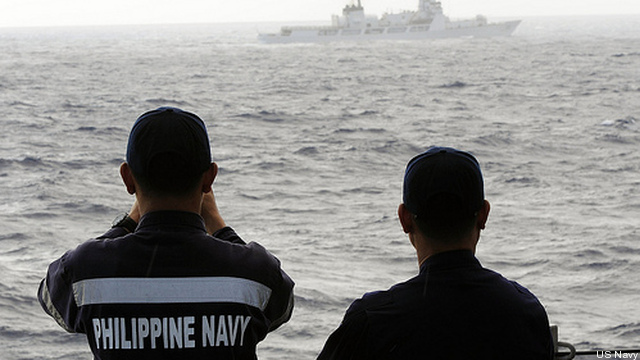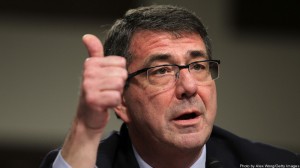Carter Evasive On South China Sea While China Targets Philippines
Posted on

Filipino sailors look across the water at one of their navy’s few frigates.
In its eagerness to avoid offending the Chinese, is the administration giving them a green light in the disputed South China Sea? This afternoon, on the eve of his departure for the Philippines and India, Defense Secretary Ash Carter carefully tiptoed around ongoing Chinese national security provocations. Several experts I spoke to were not reassured.
 Carter took pains in a speech to the Council on Foreign Relations to appear even-handed. “China is one of many claimants to various features throughout the region, many of which have taken steps which we oppose, namely militarization, but over last year the scale and scope of China’s [activities] have outstripped anybody else’s,” Carter said when the Council on Foreign Relations moderator, Mary McInnis Boies, pressed him after his prepared remarks. “It won’t affect our operations, but it disquiets the region.”
Carter took pains in a speech to the Council on Foreign Relations to appear even-handed. “China is one of many claimants to various features throughout the region, many of which have taken steps which we oppose, namely militarization, but over last year the scale and scope of China’s [activities] have outstripped anybody else’s,” Carter said when the Council on Foreign Relations moderator, Mary McInnis Boies, pressed him after his prepared remarks. “It won’t affect our operations, but it disquiets the region.”
Our response in the South China Sea has been criticized as weak, noted the moderator, with only two Freedom of Navigation Operations sailing through Chinese-claimed waters in recent years. And those were limited themselves to “innocent passage” rather than military activity. What signal did those FONOPS send?
“Their purpose isn’t to signal. Their purpose is they’ve been going on for decades now,” said Carter. (He neglected to mention the US ceased Freedom of Navigation Operations within the crucial 12-mile limit of Chinese-claimed territory for three years and only resumed after a congressional outcry). “The basic point here is the United States here and everywhere around the world — whether it’s the Arctic, whether it’s the Horn of Africa — we, along with virtually everyone else, insist on freedom of navigation within international law.”
Will US ships or aircraft be challenging Chinese claims again? Carter said nothing specific in the Q&A nor in his speech.
“You have this same formulation — ‘we will sail and fly where we want‘ — except we haven’t. Where’s that third FONOP?” asked Dean Cheng of the Heritage Foundation. “If you’re going to come [help out in the South China Sea], but only after the Chinese have signed off on climate change, you’re telling me where I stand on your priority list.”
Carter is walking a fine line. On the one hand, his military subordinates — especially Adm. Harry Harris, chief of Pacific Command (PACOM) — want the US to step up challenges to China. On the other hand, President Obama’s top aides on the staff of the National Security Council want to keep the South China Sea issue quiet so the White House, presumably so the US can cooperate with China on a host of other issues: trade, climate change, Iran, North Korea.
How far has the contention gone? An article in yesterday’s Navy Times said that “National Security Adviser Susan Rice imposed a gag order on military leaders” ahead of last week’s visit by Chinese president Xi Jinping to Washington.
“Friction between PACOM and the White House has been evident for quite some time, since the CNN reporter flew in a P-8 over the South China Sea and Adm. Harris called China’s artificial islands a ‘Great Wall of Sand,'” said Bonnie Glaser, director of the China Power Project at the Center for Strategic & International Studies (CSIS). “For the White House, this is one issue and part of a larger US-China relationship. For PACOM, it is front and center.”
Some friction between the military commander in theater and civilian policymakers in DC is to be expected, said a former aide to the Chief of Naval Operations. “The back and forth, the friction if you will, is normal,” said Bryan Clark, now with the Center for Strategic & Budgetary Assessments. “But what’s been different [is] the lengths that they’ve gone to keep things calm on the military or security side.”
So among the military and policy specialists, Clark said, “the level of frustration’s maybe a little bit higher [than usual].”
It’s a “boiling the frog” argument, Clark said. While the US avoids confrontation, China keeps creating facts on the ground, such as military bases and artificial islands. Because they’re getting more entrenched all the time, every day we do not act, action gets harder to take.
“There’s a desire not to rock the boat for the rest of the president’s term, and that’s just not going to happen,” said Greg Poling, director of the Asia Maritime Transparency Initiative at CSIS. “We’re going to have to act, and I think it’s better to act proactively.”
The Chinese have largely stopped their politically provocative and ecologically devastating construction of artificial islands — formally known as “reclamation” — since last summer, Poling said. The other good news is that the International Tribunal for the Law of the Sea is likely to rule soon against China and for the Philippines on the disputed Scarborough Shoal.
The bad news is that the good news may just make China mad. Rather than back down and accept the tribunal’s ruling, Poling predicts, they’ll make some dramatic demonstration to show that, court be damned, they stand by their claims.
“The big concern now is whether or not — [either] ahead or after a ruling of the court — they’ll decide to do reclamation on Scarborough Shoal… which would be a game changer,” Poling said. Unlike previous artificial islands in the Spratlys, one on Scarborough would be in easy missile range of Manila.
While the Chinese haven’t started actual land reclamation on Scarborough Shoal, said Clark, “there’s been a lot of Chinese fisherman picked up down there, doing illegal fishing, and also there’s been more Chinese coast guard and civilian law enforcement [activity], which is leading some people to believe this may be a prelude to the Chinese going down there and starting some island building.”
What would the US do? Carter didn’t offer any answers. “As President Obama has made clear, our commitment to the Philippines is iron-clad,” he said.
That’s “a little frustrating,” said Poling. “This has become the administration’s catchphrase and it both confuses and worries many Filipinos who assume that the refusal to offer specifics must mean that it is not actually ‘ironclad’ after all.”
“The No. 1 thing the secretary could say would be a clarification of our treaty commitment to the Philippines [to] send a strong deterrent message,” Poling said: a declaration that any unprovoked attack on Philippine forces in the disputed waters would trigger the defense treaty.
Bryan Clark isn’t so sure. “The US should say we’re going to help countries protect their EEZs [Exclusive Economic Zones, but] there is a moral hazard here,” he said: “The Philippines may provoke China, expecting the US to have their back.” Then the US has the unenviable choice of confronting China or leaving an ally in the lurch, since “the Philippines don’t have a lot of military capability to do much about this.”
The US is upping cooperation with the Philippines, and Carter may well announce more measures when he gets there. The two countries agreed to reopen US military access to five bases — the Enhanced Defense Cooperation Agreement — and to channel $79 million in 2015 Maritime Security Initiative funding to build up the Filipino forces. Those are important long-term efforts, but the Philippines have to get through the short term first.
But Carter’s speech today added no specifics. “If you substituted ‘Europe’ for ‘Asia’ and said ‘Ukraine‘ or ‘Baltics‘ for ‘South China Sea,’ you could make almost the exact same speech. ‘We’re here, we’re strong, we’re allies, trust us,'” Cheng summed up. “If I’m the Filipinos, exactly what is it that you’re offering me to reassure me?”
That is a question this administration seems loathe to answer.
Subscribe to our newsletter
Promotions, new products and sales. Directly to your inbox.
